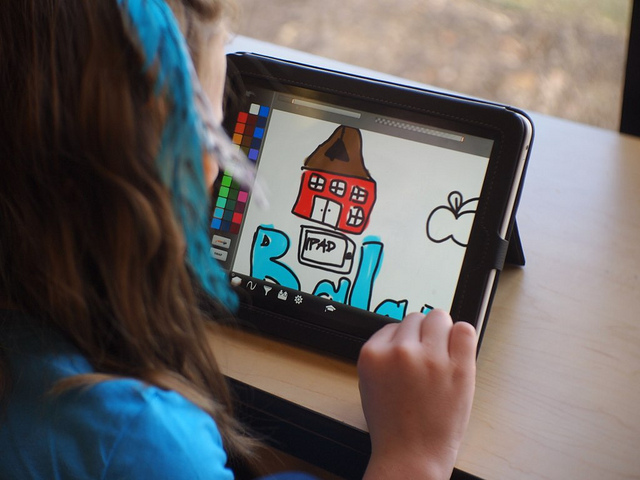What happens when middle schoolers take to Twitter? They become learners

Fully 92 percent of American teenagers go online daily. More than half of them do so several times a day and a quarter are online “almost constantly.”
I’m a mother of two teenagers who fall into that latter category. And as a parent and a teacher educator, I work on ways in which we might capitalize on teens’ social nature and fondness for technology to promote something positive.
A question I wrestle with is: can social media help students learn? Or is it just wishful thinking?
Over the past decade, my colleagues and I at the Tarrant Institute for Innovative Education have worked with hundreds of middle school teachers to integrate technology with meaningful learning. Our research suggests that a one-to-one computing environment, where every student has access to an Internet-accessible device such as a tablet, netbook or laptop, can be a powerful complement to middle-grades teaching practices.
Learning through Twitter
Most research on the use of Twitter for learning has been conducted with undergraduate and graduate students. Research with teenagers, however, has found that students use social media for self-expression, communication, friendship maintenance and information.
So, recently, one of our partner teachers explored the potential of social media to promote learning. Ryan Becker, a teacher at a public middle school, wondered if Twitter might be an effective way to extend classroom learning and to link students to “real world” science.
Working with 128 eighth graders over two years in his physical science classes, Becker first helped each of his students establish a Twitter account specifically for their science learning.
He provided them with a starter list of accounts to follow, such as the National Aeronautics and Space Administration (e.g., @NASA, @SpaceStation, @MarsCuriosity); the radio program Science Friday (@SciFri); Emily Lakdawalla, a science writer and blogger; and @realscientists, a Twitter account that rotates weekly among scientists from diverse branches of science who share interesting details about their lives and their work. He also encouraged students to expand the list of accounts based on their own science-related interests.
Next, students got down to some real work. Both during class and for homework, students were asked to read and tweet regularly about science. They posted pictures and videos to illustrate scientific concepts, such as “acceleration” or “friction.”

Ryan Becker, CC BY
They tweeted about their learning, posting personal examples of Newton’s First Law and summarizing chemistry in a mere 140 characters. They tweeted about class projects in order to generate ideas or update others on their progress. And they used Twitter to inspire each other, such as posting videos of successful Rube Goldberg machines, a device that performs a simple task in a complicated fashion, when they were building similar machines in class and sharing their own personal connections and observations.
Based on this Twitter project with middle schoolers and Becker’s subsequent doctoral research with high school students, we found students learned through Twitter in multiple ways.
How Twitter helped students
First, selecting whom to follow based on their own interests helped to personalize the curriculum for students – an approach that is gaining rapid momentum through recent philanthropic and federal funding efforts.
Second, by tweeting about their daily science learning, students found an immediate and potentially unlimited audience for their tweets. Students who were interested in space, for example, could be followed by classmates or an astronomer. They could tweet questions directly to accounts covering missions throughout our solar system.
In almost all cases, the tweets reached a larger audience than was otherwise possible in a classroom.

Third, using Twitter expanded students’ literacy opportunities. For example, most of the tweets students encountered included links to science-related, informational text, such as blogs and research studies, all of which were related to students’ self-identified interests.
Having to distill their own learning into tweets also called for students to use concise language to convey complex ideas, a challenging skill for many. They even integrated different writing genres into their work, such as these sci-kus (haikus that are science-related).
Because tweets are sent and received instantaneously, students’ thoughts and questions could be viewed in real time. Learning how well students were understanding the latest science concepts in turn helped their teacher adjust how and what he taught next.
An earlier study by California State University researcher Carol VanVooren and middle school teacher Corey Bess showed that the use of Twitter helps improve student learning. In that study the researchers found that when teachers used Twitter to reinforce classroom instruction, students performed better on standardized tests.
Challenges of Twitter-based learning
Despite this promising evidence, our research on using Twitter with middle and high school students revealed a number of challenges.
For example, most students in Becker’s classroom did not have Twitter accounts, which was not surprising given that most teens favor Facebook, Instagram and Snapchat as their top social media platforms. Students needed guidance on how to structure a tweet and how to assess the reliability of content – both tasks that took time during the school day. Valuable learning time was also eaten up by the undependable nature of technology, such as inconsistent Wi-Fi and inadequate bandwidth.
Overall, however, our research found the benefits of Twitter far outweighed the drawbacks. Embracing Twitter as part of class – as opposed to teaching the type of stand-alone social media unit so often found in schools – helped students grapple with many of these issues in an authentic way.
Two years of survey data from the 128 eighth graders revealed that over 90 percent of students felt Twitter enabled them to follow real science in real time and to interact with others outside of class. This also helped them to make connections between science and their lives and personal interests.
![]() Clearly, we need a lot more research on the use of social media in middle and high schools to better understand its ultimate potential for promoting learning. But in the meantime, in this media-saturated era, teens can benefit from the opportunity to experience the power of promising digital technologies alongside knowledgeable adults.
Clearly, we need a lot more research on the use of social media in middle and high schools to better understand its ultimate potential for promoting learning. But in the meantime, in this media-saturated era, teens can benefit from the opportunity to experience the power of promising digital technologies alongside knowledgeable adults.
Penny Bishop, Associate Dean and Professor of Middle Level Education, University of Vermont
This article was originally published on The Conversation. Read the original article.




